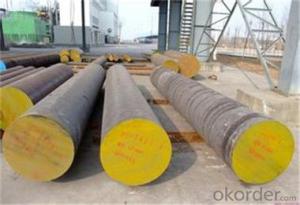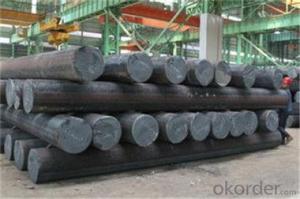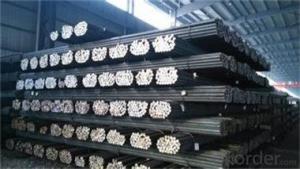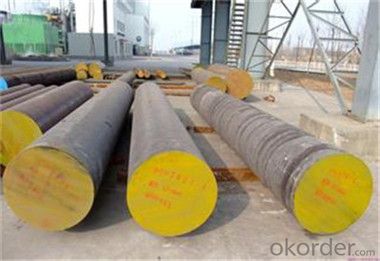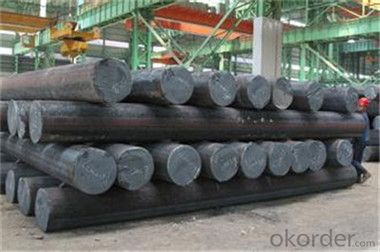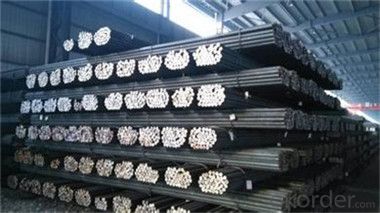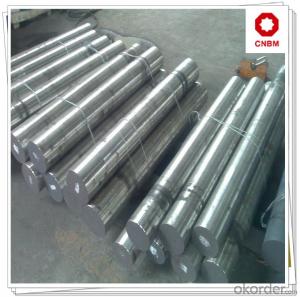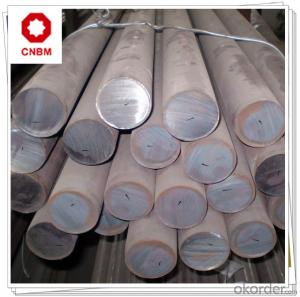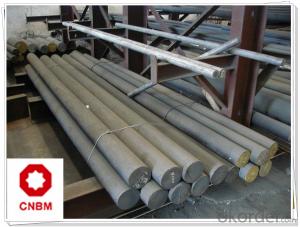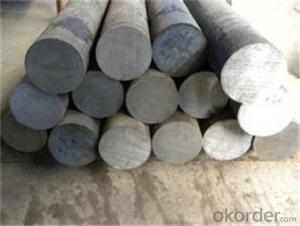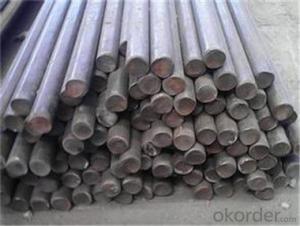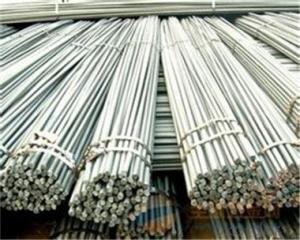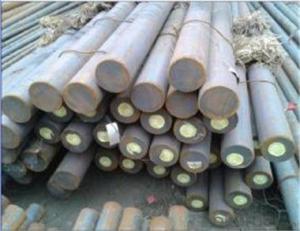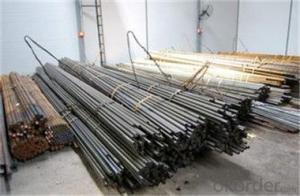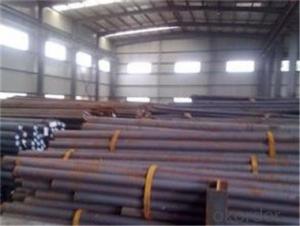Hot Rolled 12mm Steel Rod Price Steel Bars
- Loading Port:
- Tianjin
- Payment Terms:
- TT OR LC
- Min Order Qty:
- 22 m.t.
- Supply Capability:
- 2000000 m.t./month
OKorder Service Pledge
OKorder Financial Service
You Might Also Like
Description of steel round bar:
(1) Thickness of not more than 2MM sheet, efficient blanking die, punch die and pressure die etc.
(2) All kinds of scissors, inserts, woodworking blade.
(3) Thread rolling die and wear-resistant slider.
This steel has good workability,processing deformation is small, anti fatigue performance is quite good, belongs to medium quenching steel,4140 after heat treatment, it has good strength and good comprehensive mechanical properties.The process is good.
Festures of steel round bar:
4340 Forged Round Steel Bar
1.Dia 80-800mm Length:2000-13000mm or as required
2.Technique:Forged
3.Delivery Time:45 days
Specifications of steel round bar:
Round bar | Diameter(mm) | Length (mm) | |
10~800 | 2000~5800 | ||
plate/sheet | Thickness(mm) | Width (mm) | Length (mm) |
10~800 | 80~2300 | 2000~5800
|
Images of steel round bar:
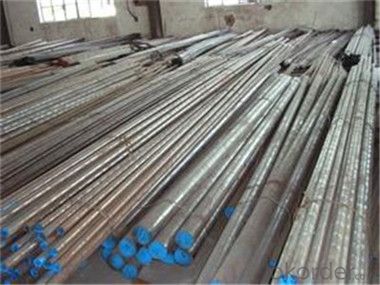
FAQ:
1. How long is the lead time?
Delivery time: 45 days after order confirmed.
2. What payment term do you accept?
Payment: T/T or L/C at sight.
- Q: What are the applications of steel round bars in the aerospace industry?
- Due to their exceptional strength, durability, and versatility, steel round bars are extensively utilized in the aerospace industry. These bars find application in various areas, including the following: 1. Structural Components: In the production of structural components in the aerospace industry, steel round bars are commonly employed. Aircraft frames, landing gear, wing spars, and other critical structural elements are manufactured using these bars. Steel's high tensile strength guarantees the structural integrity and safety of the aircraft. 2. Fasteners: Fasteners such as bolts, screws, and pins are produced using steel round bars. These fasteners play a crucial role in holding different parts of the aircraft together. Steel's strength and resistance to fatigue make it the ideal material for these vital connections. 3. Engine Components: Various engine components are manufactured using steel round bars. Shafts, crankshafts, connecting rods, and turbine blades are among the components that benefit from the use of these bars. These components need to withstand high temperatures, pressure, and mechanical stress, and steel's heat resistance and strength make it suitable for these demanding conditions. 4. Landing Gear: The landing gear of an aircraft experiences immense stress during takeoff, landing, and taxiing. Steel round bars are used in the construction of landing gear components such as axles and struts. The high strength and toughness of steel ensure the landing gear's ability to withstand the forces encountered during landing operations. 5. Tooling and Fixtures: Tooling and fixtures necessary for the production and maintenance of aircraft are manufactured using steel round bars. These tools and fixtures are utilized in various processes, including machining, assembly, and inspection. Steel's hardness and machinability make it the ideal material for these applications. In conclusion, steel round bars have a wide range of applications in the aerospace industry, including structural components, fasteners, engine parts, landing gear, and tooling. The unique combination of strength, durability, and versatility offered by steel is essential in guaranteeing the performance, safety, and reliability of aerospace systems.
- Q: How do you calculate the shear strength of a steel round bar?
- The shear strength of a steel round bar can be calculated by using the formula: Shear Strength = 0.6 * Ultimate Tensile Strength Where the Ultimate Tensile Strength is the maximum stress a material can withstand before failure.
- Q: What are the different types of steel round bars used in the automotive chassis components?
- There are several different types of steel round bars used in automotive chassis components, including carbon steel, alloy steel, stainless steel, and tool steel. Each type of steel offers different properties and strengths, allowing for the production of reliable and durable chassis components.
- Q: What's the difference between a round tube and a round tube?
- Round steel is solid and round tubes are hollow
- Q: Can steel round bars be used for making mining equipment?
- Certainly! Mining equipment can indeed be made using steel round bars. These bars, owing to their exceptional strength, durability, and resistance to wear and tear, are widely utilized in the manufacturing process of various mining equipment. They are particularly suitable for applications that demand robust and heavy-duty machinery, such as drilling rigs, excavators, crushers, and conveyor systems employed in the mining industry. The adaptability of steel round bars enables them to be machined, welded, and shaped into diverse forms and sizes, thus facilitating the customization of mining equipment to cater to specific requirements. Moreover, steel round bars exhibit remarkable resilience in mining environments, enduring exposure to abrasive substances, extreme temperatures, and substantial loads.
- Q: Can steel round bars be used for making engine parts?
- Yes, steel round bars can be used for making engine parts. Steel round bars are often used in the manufacturing of engine components due to their high strength, durability, and resistance to heat and corrosion. They can be machined into various shapes and sizes to create engine parts such as crankshafts, camshafts, connecting rods, and valves. The use of steel round bars ensures the required mechanical properties and structural integrity needed for engine performance and reliability. Additionally, steel round bars can be heat-treated and surface-treated to further enhance their properties, making them suitable for engine applications.
- Q: What are the advantages of using corrosion-resistant steel round bars?
- There are several advantages of using corrosion-resistant steel round bars. Firstly, these bars are highly resistant to corrosion, which means they can withstand exposure to moisture, chemicals, and other corrosive elements without undergoing significant damage. This makes them ideal for use in environments where there is a high risk of corrosion, such as coastal areas or industrial settings. Secondly, corrosion-resistant steel round bars have a longer lifespan compared to regular steel bars. The ability to resist corrosion ensures that these bars maintain their structural integrity and strength over time, reducing the need for frequent replacements. This not only saves costs but also minimizes the downtime associated with maintenance and repairs. Furthermore, the use of corrosion-resistant steel round bars enhances safety. When steel bars corrode, they can weaken and eventually fail, posing a risk to buildings, infrastructure, and even human lives. By using corrosion-resistant steel round bars, the risk of structural failures due to corrosion is significantly reduced, ensuring the safety of people and property. Additionally, corrosion-resistant steel round bars offer versatility in design and application. These bars can be easily fabricated and shaped into various configurations, making them suitable for a wide range of construction projects. They can be used in the construction of bridges, buildings, marine structures, pipelines, and many other applications where corrosion resistance is vital. Lastly, corrosion-resistant steel round bars contribute to environmental sustainability. The longer lifespan of these bars reduces the need for frequent replacements, thereby decreasing the demand for raw materials and reducing waste. Moreover, their resistance to corrosion means less maintenance and repair work, resulting in lower energy consumption and fewer carbon emissions. In conclusion, the advantages of using corrosion-resistant steel round bars include their resistance to corrosion, extended lifespan, enhanced safety, versatility in design, and positive environmental impact. These qualities make them a cost-effective and reliable choice for various construction and infrastructure projects.
- Q: What is the maximum load capacity of a steel round bar?
- The maximum load capacity of a steel round bar depends on various factors, including the diameter, length, and grade of the steel. Steel round bars are designed to withstand different levels of stress and can have varying load capacities. Generally, the load capacity is determined by the yield strength and ultimate tensile strength of the steel. To determine the maximum load capacity of a specific steel round bar, it is necessary to consult engineering specifications or reference materials provided by the manufacturer. These specifications will provide the necessary information to calculate the load capacity based on the specific dimensions and properties of the round bar. It is important to note that load capacity calculations should be carried out by qualified professionals with a thorough understanding of structural engineering principles and material properties.
- Q: What are the advantages of using high-strength steel round bars?
- Using high-strength steel round bars in various applications brings several advantages. Firstly, these bars have an exceptional strength-to-weight ratio. Despite being lighter than other materials, they possess significantly higher strength. This advantage allows for the construction of sturdy and lightweight structures, making them ideal for weight reduction in industries like aerospace and automotive. Secondly, high-strength steel round bars offer excellent resistance to wear, fatigue, and impact. This makes them highly durable and able to withstand heavy loads and repeated stress, enhancing the lifespan and performance of structures or components. This is particularly beneficial in construction, where materials must maintain structural integrity over time. Furthermore, high-strength steel round bars provide improved design flexibility due to their versatility. They can be easily shaped, machined, and welded, allowing for the creation of complex and customized structures or components. This enables engineers and designers to optimize their designs and achieve specific performance requirements. In addition, high-strength steel round bars offer enhanced resistance to corrosion, making them suitable for applications in harsh environmental conditions. By utilizing these bars, structures or components can maintain their integrity and functionality for extended periods, reducing the need for frequent maintenance and replacement. Finally, using high-strength steel round bars can lead to long-term cost savings. Despite their higher initial cost, their superior strength and durability significantly reduce maintenance, repair, and replacement costs over time. Additionally, their lightweight nature contributes to fuel efficiency, resulting in cost savings in transportation and other industries. Overall, the advantages of using high-strength steel round bars include a high strength-to-weight ratio, excellent resistance to wear and fatigue, improved design flexibility, enhanced corrosion resistance, and potential cost savings. These benefits make them a preferred choice for a wide range of applications.
- Q: How do I determine the strength and hardness of a steel round bar?
- To determine the strength and hardness of a steel round bar, you can perform various tests such as tensile testing, hardness testing, and impact testing. Tensile testing involves applying a pulling force to the steel bar until it breaks, measuring the maximum force it can withstand, and calculating its ultimate tensile strength. Hardness testing, on the other hand, measures the resistance of the steel to indentation or scratching, using methods like Brinell, Rockwell, or Vickers tests. Impact testing assesses the steel's ability to absorb energy by subjecting it to a sudden impact and measuring the resulting deformation. By conducting these tests, you can accurately determine the strength and hardness characteristics of a steel round bar.
Send your message to us
Hot Rolled 12mm Steel Rod Price Steel Bars
- Loading Port:
- Tianjin
- Payment Terms:
- TT OR LC
- Min Order Qty:
- 22 m.t.
- Supply Capability:
- 2000000 m.t./month
OKorder Service Pledge
OKorder Financial Service
Similar products
Hot products
Hot Searches
Related keywords
